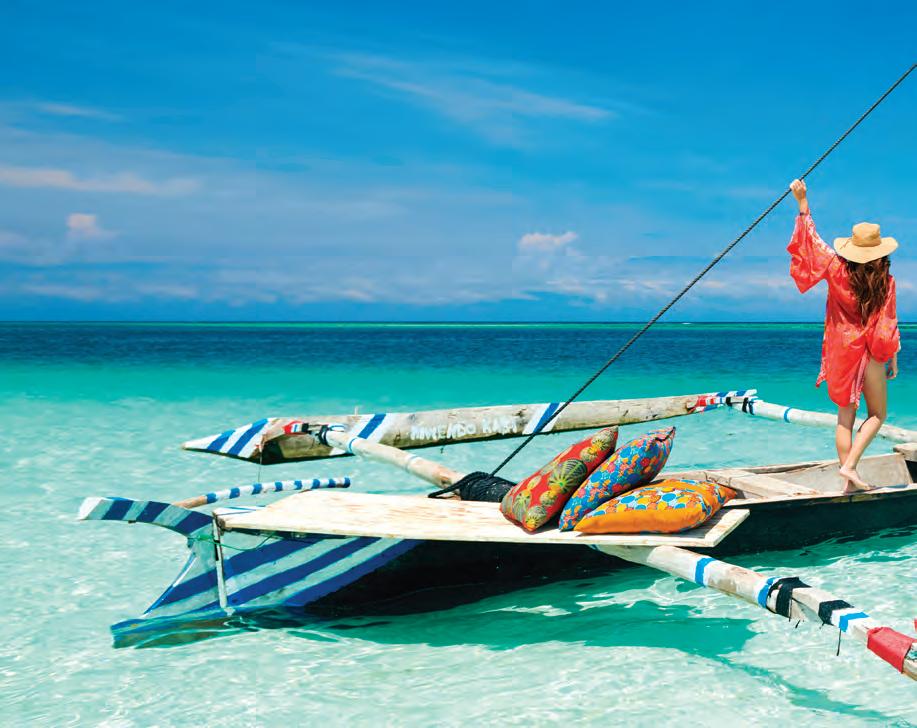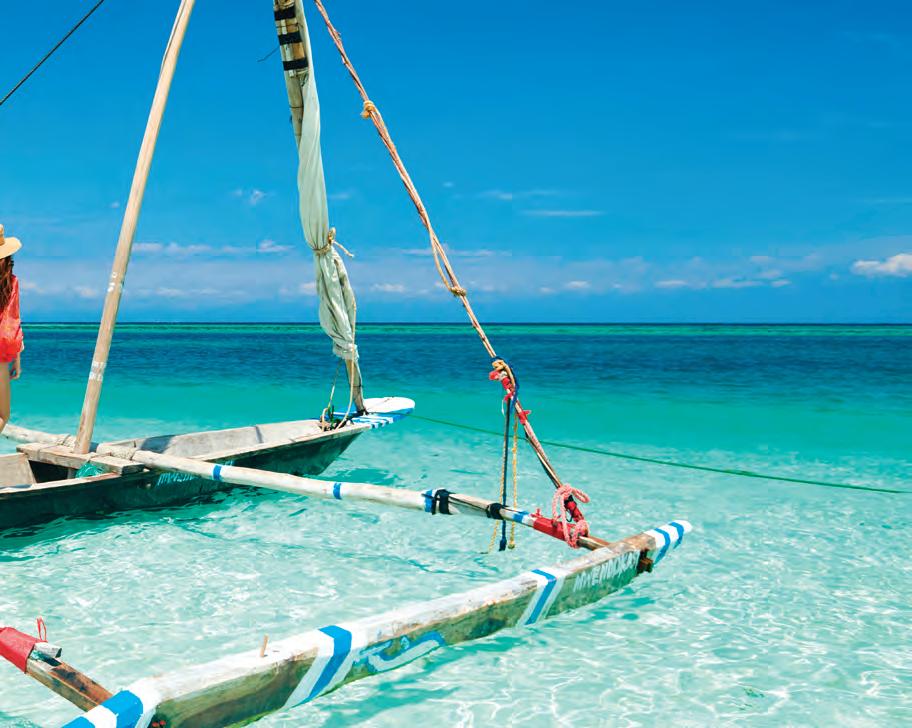
6 minute read
Zanzibar & Its Island
Zanzibar and The Islands Zanzibar and The Islands
The famous spice island with exotic The famous spice island with exotic smells and outstanding beaches! smells and outstanding beaches!
Advertisement
ZANZIBAR’S COASTLINE ZANZIBAR’S COASTLINE OFFERS SOME OF THE OFFERS SOME OF THE BEST BEACHES IN THE BEST BEACHES IN THE WORLD, BUT SAND AND WORLD, BUT SAND AND ON WHAT SIDE OF THE ON WHAT SIDE OF THE ISLAND YOU’RE ON. ON ISLAND YOU’RE ON. ON REEFS AND SAND BARS REEFS AND SAND BARS OFFSHORE, AND LOW OFFSHORE, AND LOW POOLS OF STARFISH, POOLS OF STARFISH, SMALL MINNOWS, AND SMALL MINNOWS, AND ANEMONES. UP NORTH, ANEMONES. UP NORTH, OCEAN SWIMMING IS OCEAN SWIMMING IS MUCH LESS SUSCEPTIBLE MUCH LESS SUSCEPTIBLE TO THE TIDES, AND TO THE TIDES, AND SMOOTH BEACHES AND SMOOTH BEACHES AND WHITE SAND MAKE FOR WHITE SAND MAKE FOR DAZZLING DAYS IN THE DAZZLING DAYS IN THE SUN.SUN.
Zanzibar is the semiautonomous part of Tanzania in East Africa. It is composed of the Zanzibar Archipelago in the Indian Ocean, 25–50 kilometres (16–31 mi) off the coast of the mainland, and consists of many small islands and two large ones: Unguja (the main island, referred to informally as Zanzibar) and Pemba. The capital is Zanzibar City, located on the island of Unguja. Its historic centre is Stone Town, which is a World Heritage Site.
Portuguese invasion and control of the Swahili Coast in the late 16th century ended the golden age of the archipelago, although the Omani Arabs returned to power less than a century later. Today, many of the winding streets and high townhouses of old Stone Town remain unchanged and visitors can walk between the sultan’s palace, the House of Wonders, the Portuguese fort and gardens, the merchants’ houses, and the Turkish baths of the old city. Day-long spice tours to working plantations offer visitors the chance to observe the cultivation of cloves, vanilla, nutmeg, cinnamon, and other spices that have made the island famous.
The port city of Stone Town dominates the west coast, and although the beaches of Mangapwani, where slave caves are visible at low tide and nearby Bububu are less than half an hour’s drive away, a night or two spent on the east or north cost

KNOWN AS THE SPICE ISLAND, THE KNOWN AS THE SPICE ISLAND, THE BEAUTIFUL ISLAND OF ZANZIBAR ON BEAUTIFUL ISLAND OF ZANZIBAR ON AFRICA’S EAST COAST IS BURSTING WITH AFRICA’S EAST COAST IS BURSTING WITH CULTURE AND HISTORY, SEEMINGLY AT CULTURE AND HISTORY, SEEMINGLY AT ODDS WITH ITS IDYLLIC GEOGRAPHY OF ODDS WITH ITS IDYLLIC GEOGRAPHY OF WHITE-SAND BEACHES WITH PALMS WHITE-SAND BEACHES WITH PALMS SWAYING LAZILY IN THE SEA BREEZE. SWAYING LAZILY IN THE SEA BREEZE. TOGETHER THIS MAKES ZANZIBAR TOGETHER THIS MAKES ZANZIBAR A FABULOUS PLACE TO EXPLORE AS A FABULOUS PLACE TO EXPLORE AS WELL AS A DREAM TO RELAX AND WELL AS A DREAM TO RELAX AND UNWIND. UNWIND.
is well worth the extra hour it takes to drive there. That said, the Chole Island Marine Park just off Stone Town – and nearby Prison, Grave, and Snake Islands – make a refreshing day-trip and a good break from exploring the winding passageways of the old city.
On the south coast of Zanzibar lies the Menai Bay Conservation Area, a sea turtle protection area for the endangered species that come to breed on the island. Roads to the southeast coast take visitors through the Jozani Forest, home to Zanzibar’s rare Red Colobus monkeys and a number of other primate and small antelope species.
THE ISLANDS OF ZANZIBAR
Zanzibar has many offshore islands, which provide a stunning location for a day trip or a longer stay. Boats to any of the islands off Zanzibar or Pemba can be hired easily from local fishermen. In Stone Town, ask at the ‘big tree’ opposite Mercury’s restaurant on the seafront, or arrange a day trip with one of the tour companies listed in this guide.
CHAPWANI ISLAND
A slightly more upmarket choice than Prison Island, Chapwani, or Grave island, is the site of a luxury hotel, but day visitors who come to eat and drink in the bar and restaurant are permitted. Chapwani is the site of a British naval cemetery, the final resting place of sailors who perished while serving in Zanzibar. The victims of the World War One attack on the HMS Pegasus by the German warship Konigsberg are also buried here. It’s interesting to wander around the graveyard


and decipher the ages and causes of death of the servicemen – many died from tropical disease, or were killed in skirmishes with local slavers. Chapwani also has a beautiful white sandy beach and a small population of duikers (a type of miniature antelope), as well as some interesting birdlife. Government of Zanzibar, which rules the country to this day.
BAWE ISLAND
Bawe Island has some of excellent snorkeling spots. Around a 30-minute boat ride and slightly more expensive than the boat to Prison Island, it is much less visited. In 1870, the island was used to anchor the first telegraph cables to Zanzibar linking it with Aden, South Africa and the Seychelles. A further line was run across to Stone Town, into the old Extelcoms building, now the Zanzibar Serena Inn. If complete isolation and privacy is what you are after, then Bawe Tropical Island is the perfect place to stay. There are 15 private cottages scattered along the beach front, all with breathtaking panormaic views of the ocean, and all tastefully decorated in soft colours to enhance the relaxed pace of life. The beach is excellent at low tide, with unusual stone formations, and there is some good snorkelling to be had on the island’s reef.
PRISON ISLAND
Prison Island, also known as Changuu Island is one of the most popular destinations for day trips from Stone Town. Just a short boat ride away, the island offers excellent snorkeling, a nature trail, small beach and the unusual attraction of a sanctuary for giant tortoises. Despite its name, the closest the island has come to actually being used as a prison was by its first owner, a wealthy Arab who sent unruly slaves there for discipline. In 2006, many of the islands old buildings were restored, and Changuu Private Island Paradise was opened, offering 15 deluxe cottages all on the seafront, affording maximum seclusion and privacy. There are also 12 standard rooms in the old quarantine area, with fantastic views back across to Stone Town. If swimming and snorkelling in the crystal blue waters gets too much, have a paddle in the freshwater swimming pool, or hit the ball around on the floodlit tennis court. Mathews’ restaurant offers excellent seafood lunches, and 4 course dinners, all overlooking the restored prison ruins.
CHUMBE ISLAND
Six kilometres south of Stone Town, surrounded by pristine coral reef, Chumbe Island Coral Park is one of the world’s most successful eco-tourism projects. In 1994 the reef surrounding Chumbe Island was named Tanzania’s first Marine National Park. The island itself, covered with lush mangrove forest, is a designated forest reserve. Visitors can come for the day to snorkel over the incredible coral reef, home to over 370 species of fish, turtles and dolphins. To experience Chumbe Island properly, stay the night in one of the seven ‘ecobandas’ that nestle in the forest. Each is a two-storey, private cottage constructed out of local materials and decorated with shells, driftwood and colourful local fabrics. Water and energy on Chumbe are self-sustaining and provided by nature - the roofs of the bandas and the education centre have been designed to catch and filter rainwater, which is then heated by solar power.
The magic of Zanzibar Island is that it is a multi-faceted destination, offering a unique blend of idyllic beaches, intriguing history, cultural diversity, tasty cuisine, exotic spices, and rich flora and fauna.













